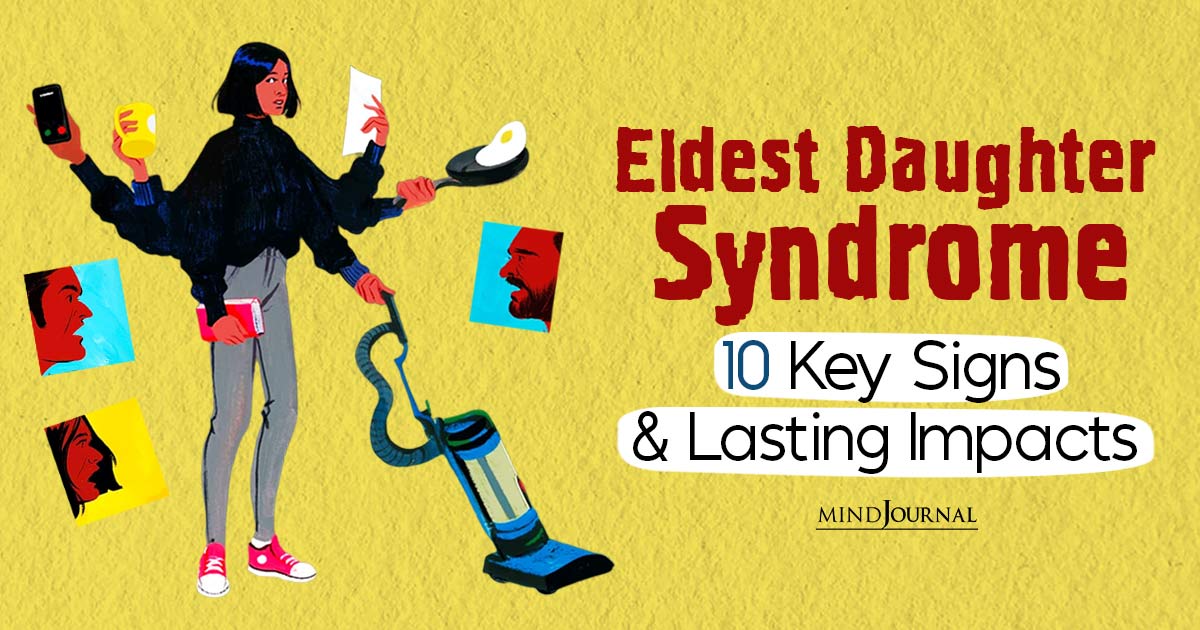Are you familiar with the term – Eldest Daughter Syndrome? It’s a phenomenon that delves into the emotional weight often placed on the shoulders of the oldest daughters in many families, right from a tender age.
From tending to their younger siblings’ needs and assisting with daily household chores to taking care of ailing parents or even handling mundane tasks like sorting online orders, eldest daughters frequently bear a substantial but often invisible load of domestic responsibilities from their early years.
Now, you might wonder, what’s the harm in this? Shouldn’t older children naturally lend a helping hand and look out for their younger siblings? Isn’t it believed that girls are inherently better at caregiving? These commonly held beliefs are so deeply ingrained that they can obscure the underlying issue at hand.
Let’s explore what is eldest daughter syndrome and how it looks like.
Related: The Good Daughter Syndrome: 7 Signs of Narcissistic Mother Empath Daughter Dynamics
What Is Eldest Daughter Syndrome?
Eldest Daughter Syndrome is a fascinating aspect of family dynamics and psychology. It focuses on the experiences of the oldest daughters in families. These women often find themselves taking on more responsibilities at a young age, such as looking after their younger siblings or helping with household chores.
This early caregiving role can make them more responsible and mature compared to their peers. However, it’s not all smooth sailing. Eldest daughters can also face challenges like pressure to be perfect and occasional jealousy towards their younger siblings who may receive more attention.
In essence, it is about how being the firstborn can shape a person’s life and personality, creating a unique blend of strengths and difficulties.
Understanding this syndrome helps us grasp the intricate ways in which birth order and family dynamics influence an individual’s development and outlook on life.
Now that we know what is eldest daughter syndrome, let’s find out the eldest daughter syndrome symptoms.

Eldest Daughter Syndrome Symptoms
While not an official medical condition, eldest daughter syndrome encompasses a range of emotional and behavioural characteristics often observed in the oldest daughters within families.
These “symptoms” can manifest differently from person to person but generally include:
- Sense of responsibility: Eldest daughters tend to feel a strong sense of responsibility towards their family members, often taking on caregiving roles.
- Perfectionism: One of the major eldest daughter syndrome symptoms. You set high standards for yourself, striving for perfection in your tasks and behaviours.
- Leadership qualities: Many eldest daughters exhibit natural leadership skills and take charge in family situations.
- Maturity beyond their age: You often appear more mature than your peers due to early exposure to adult responsibilities.
- Nurturing instinct: Eldest daughters may possess a strong nurturing instinct, looking out for the well-being of their siblings and sometimes even their parents.
- Stress and pressure: The pressure to excel and meet parental expectations can lead to increased stress levels.
- Sensitivity to criticism: You might be sensitive to criticism and fear disappointing your loved ones.
- Jealousy and sibling rivalry: Feelings of jealousy towards younger siblings receiving more attention are not uncommon.
- Difficulty delegating: Due to eldest daughter syndrome, you may find it challenging to delegate tasks, as you’re used to taking on responsibilities yourself.
- Desire for independence: As they grow older, some eldest daughters may yearn for more independence and a break from their caregiving roles.
It’s important to note that these “symptoms” aren’t necessarily negative, as they often reflect admirable qualities. However, being aware of the potential challenges associated with Eldest Daughter Syndrome can help you and your family better navigate these dynamics and find a healthy balance between responsibilities and personal growth.
Effects Of Eldest Daughter Syndrome
Positive Effects
1. Responsibility and Leadership
Eldest daughters often develop strong leadership skills and a sense of responsibility from an early age, which can serve them well in various aspects of life. This can lead to fulfilling careers and respected roles in their communities.
2. Maturity
They tend to exhibit maturity beyond their years, making them dependable and reliable. This quality can make them excellent friends and confidants, sought after for advice and support.
3. Nurturing Nature
Many eldest daughters have a natural inclination towards caregiving, fostering strong, supportive relationships with family and friends. Their empathetic nature often creates a harmonious and caring environment within their social circles.
4. Achievement-Oriented
They often strive for excellence and are driven to achieve their goals. This drive can lead to personal and professional success, as they are determined to overcome challenges.
Challenges and Negative Effects
1. Pressure to Be Perfect
One of the biggest eldest daughter syndrome symptoms is this.
The expectation to set a good example can create immense pressure, leading to perfectionism and stress. This constant quest for perfection can sometimes hinder their ability to appreciate their own accomplishments.
2. Sibling Rivalry
Eldest daughters may experience jealousy or rivalry with younger siblings, especially when they perceive disparities in attention or treatment. This rivalry can strain family relationships if not managed properly.
3. High Expectations
One of the major challenges of eldest daughter syndrome is this. Parents often have high expectations for their firstborn, which can be stressful and overwhelming. Striving to meet these expectations can sometimes lead to feelings of inadequacy.
4. Difficulty Delegating
They may struggle to delegate tasks, feeling that they must handle everything themselves. This reluctance to delegate can lead to burnout and exhaustion in the long run.
5. Loss of Independence
The caregiving role can sometimes hinder their pursuit of personal independence and self-discovery. It’s important for them to strike a balance between caring for others and nurturing their own growth.
6. Stress and Burnout
What is eldest daughter syndrome? This!
The cumulative responsibilities can lead to high levels of stress and occasional burnout. This stress can impact their physical and mental well-being if not managed effectively.
7. Fear of Disappointment
One of the major eldest daughter symptoms is this.
Eldest daughters may fear disappointing their parents or loved ones, impacting their self-esteem. This fear can inhibit their willingness to take risks and pursue their own dreams.

Healing From Eldest Daughter Syndrome
1. Cut back on your responsibilities when things start to feel too overwhelming.
This is probably the most important thing you should do when it comes to dealing with eldest daughter syndrome.
To ease the burden of too many tasks, try simplifying your to-do list. If you’re always the one planning your parents’ anniversary, organizing family gatherings, or providing rides to the airport, consider sharing these responsibilities. Ask your siblings or close ones if they can help out.
Remember, it’s great to help others, but not if it makes you feel overwhelmed or exhausted. Make sure to take care of yourself first; it’s not selfish—it’s essential.
And don’t forget, it’s perfectly fine to say “no.” Set clear boundaries in your relationships so everyone knows what you can and cannot do. This way, you can maintain your well-being while still being there for others.
2. Challenge the need to be perfect all the time.
Dealing with perfectionism is important when healing from Eldest Daughter Syndrome. It’s okay not to be perfect – everyone has flaws. Embracing your imperfections and understanding that making mistakes is part of being human can be really freeing.
Instead of trying to be perfect all the time, focus on learning and growing. Mistakes are like lessons that help you become wiser and stronger.
Instead of being too hard on yourself, be kind and forgiving, just like you would be with a friend. This way, you can let go of the pressure to be perfect and be yourself.
Remember, being human means having imperfections, and that’s what makes each of us special. So, embrace your flaws, learn from your mistakes, and be proud of who you are.
Related: When You Give A Dad A Daughter
3. Treat yourself with love and speak to your inner child with compassion.
Want to heal from eldest daughter syndrome? Then, be nice to yourself.
When you do well, say something good to yourself. And if things don’t work out perfectly, that’s alright—tell yourself it’s okay. This way, you can push back against any negative thoughts from when you were a kid, thinking you had to be perfect for your family.
Talk to yourself like a good friend. When you do well, give yourself a pat on the back. And if things don’t turn out perfectly, that’s okay too—remind yourself it’s part of being human.
By speaking kindly to yourself, you can break free from the pressure to be flawless that you might have felt as a child. This self-compassion is like giving yourself a warm hug and saying, “You’re doing great, just as you are.”
4. Learn to be more assertive.
Learn to be assertive by expressing your thoughts and needs clearly and respectfully. Good communication is vital for healthy relationships. Being assertive means confidently stating your views while respecting others.
It’s not about being too pushy or too shy; it’s finding the right balance to speak up for yourself without being disrespectful. This helps you set boundaries, ask for what you need, and have better relationships.
By being assertive, you become better at handling conversations with confidence, honesty, and respect for others’ feelings.
5. Write an loving and compassionate letter to your inner child.
This is one of the best ways to heal from eldest daughter syndrome.
Many therapists suggest that within us resides an inner child, a part of ourselves that still carries the wounds and innocence of our early years. To aid in our healing journey, they propose a powerful exercise: addressing this inner child directly.
Picture yourself as the child you used to be, and think about writing a kind letter to that younger you. This helps you understand and make peace with the things you went through as a kid. It’s a way to say sorry to yourself for the tough times and start being kinder to yourself.
If writing a letter feels too daunting, simply visualizing yourself as a child and contemplating what you would say to them can also be immensely therapeutic.

6. Practice some much-needed self-reflection.
Self-reflection is a vital step in dealing with eldest daughter syndrome. It means taking time to think about how this syndrome has shaped you. Consider the roles and jobs you’ve had, like taking care of others or being a leader, and how they’ve influenced your life choices.
Think about how you’ve felt during these times—the good and the tough emotions. This helps you see which parts of your life might need some healing and growth. Self-reflection is like a map that helps you navigate towards a more balanced and fulfilling life.
7. Loosen up and have some fun.
Embrace the joy of letting go and having fun! Inject moments of playfulness and spontaneity into your life. Set aside time for dancing, running, playing games, or simply lounging in the park. These moments remind you that life isn’t solely about responsibilities.
Equally important, prioritize self-care through rest and relaxation. Ensure you get enough sleep, create space for leisure activities you enjoy, and dedicate time to rejuvenate.
These practices not only recharge your physical and mental well-being but also instill a sense of balance, allowing you to appreciate the lighter side of life while tending to your responsibilities.
Related: 50 Rules For Daughters
Takeaway
Eldest Daughter Syndrome highlights the unique challenges and strengths of the firstborn daughters in families. While it brings responsibility and leadership qualities, it can also lead to perfectionism and stress.
Healing involves setting boundaries, being kind to yourself, and learning to communicate effectively. It’s about finding balance, where you can fulfil your duties while taking care of your well-being.
By accepting imperfections, expressing needs, and enjoying fun moments, you can overcome the pressures of being the “eldest” and lead more fulfilling lives.










Leave a Reply